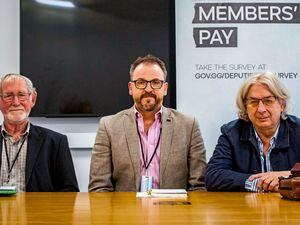‘We will have to take what comes on Brexit’
THE UK Government’s ‘mind-boggling’ incompetence has created ‘grotesque’ uncertainty around Brexit, according to a leading member of Guernsey’s finance sector.

Ahead of a crunch vote by MPs on Brexit, venture capitalist Jon Moulton also warned that Guernsey would have limited influence on the eventual outcome of Brexit and would have to ‘take what comes’.
MPs are set to decide the fate of Theresa May’s Brexit deal today. Mrs May is expected to lose the vote, but then be required to come back to the Commons with an alternative plan within three parliamentary working days.
However, crisis could ensue whatever the outcome – with Mrs May warning yesterday of ‘paralysis in Parliament’ if her deal was rejected with trust in politics suffering ‘catastrophic harm’ if Brexit were stopped.
Asked for his view on the Brexit vote by MPs, Mr Moulton said: ‘I would say don’t waste your time on it. There are so many possible outcomes and such grotesque uncertainty.
‘Guernsey is really going to have to take what comes to it. It can’t much influence the outcome.’
Mr Moulton, who had dinner with leading Brexiteer Jacob Rees-Mogg last Tuesday, added: ‘The incompetence of the UK Government is mind-boggling.’
Mrs May’s deal wasn’t a deal but only ‘an extension’, said the Guernsey resident. There could be another two years of further uncertainty even if the deal passed because of the need for more negotiations to decide the actual future UK-EU trading relationship.
An obligation for the UK to pay into EU coffers and the so-called Irish backstop were the other two key features of the withdrawal agreement, said Mr Moulton.
Depending on the outcome of the scheduled Brexit vote in the Commons, it could lead to a range of outcomes. The UK is due to leave the EU on 29 March which could end up being a no-deal.
However, MPs could put forward a range of alternative proposals. These could include suspending Article 50, which formally set in motion the process by which the UK leaves the European Union, to seek further renegotiation.
MPs may also push to hold a second referendum on EU membership or simply move to keep the UK in the bloc by abandoning Brexit wholesale. A permanent Customs union between the UK and EU could also emerge from the turmoil.
The Labour party could potentially table a vote of no confidence in Mrs May’s government in the hope of forcing a general election.
A heavy defeat could intensify calls for her to resign, while some of her supporters might suggest that she calls a general election herself.





